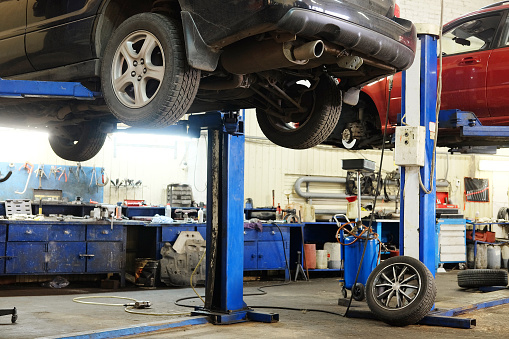All Categories
Featured
Brakes are arguably the most vital security attribute of any type of automobile. Without dependable brakes, even one of the most effective cars and truck can come to be a danger when traveling. That's why routine brake inspections are a should for ensuring your lorry quits when you need it to. Complying with a proper brake evaluation timetable can not only keep you secure but likewise aid you avoid costly fixings. Here's an in-depth overview on exactly how to appropriately evaluate your brakes and what to watch out for.
- The Relevance of Normal Brake Inspections. Brakes undertake continual damage with every usage, whether you're driving at high rates on the highway or cruising through city roads. Gradually, brake pads, blades, and various other parts use down, which can influence braking efficiency. Without regular inspections, you may not discover the progressive decrease in effectiveness till it's far too late.
Routine brake assessments permit you to catch issues early, making sure that your brakes stay receptive, reputable, and secure. Timely assessments can also save you cash by addressing small problems before they end up being pricey fixings.
- Usual Indications That Your Brakes Required Attention. While routine brake inspections are necessary, there are some warning indicators you can look out for to understand when it's time to schedule a check-up:
Squealing or Grinding Seems: High-pitched squeaks or grinding noises when using the brakes are often indications that your brake pads are worn and require substitute. Vibration or Pulsation: If you feel resonances in the guiding wheel or the brake pedal, it could indicate deformed rotors, which might need resurfacing or changing. Soft or Spongy Brake Pedal: If the brake pedal really feels uncommonly soft or mushy, there might be air in the brake lines or an issue with the master cyndrical tube. Pulling away: If your auto draws to one side while stopping, this can be caused by uneven brake pad wear or a problem with the brake fluid. Boosted Stopping Distance: If it takes longer to quit than typical, it might show that the brake pads are used, the liquid is low, or the blades are damaged. If you discover any of these signs and symptoms, it's ideal to have your brakes checked immediately.

- Secret Components Checked During Brake Inspections. During a brake inspection, a technician will examine several crucial parts of the braking system to make sure whatever is working effectively. Here are the crucial elements included:
Brake Pads: One of the most typical reason for inadequate stopping efficiency is worn-out brake pads. Inspecting the density of the pads is a top priority during every assessment. Brake Rotors: Blades ought to be smooth and devoid of grooves or fractures. Any kind of significant damages to the blades could lead to jeopardized braking efficiency and uneven pad wear. Brake Fluid: Reduced or infected brake fluid can impair braking efficiency. The specialist will inspect the liquid degrees and high quality and replace it if essential. Brake Lines and Pipes: Brake lines need to be devoid of leaks or fractures. Any type of damages to the lines can lead to loss of brake liquid, causing brake failing. Brake Calipers: The calipers apply pressure to the brake pads. They should be examined for indicators of wear or leaks to ensure they are working correctly. Consistently examining these components assists maintain your brake system in peak condition, enabling you to stop your vehicle safely and effectively.
- How Often Should You Have Your Brakes Evaluated? The basic suggestion is to have your brakes checked a minimum of once a year or every 12,000 miles, relying on your driving practices. Certain driving problems might need more frequent inspections:
Hefty Web Traffic: If you commonly drive in stop-and-go traffic, your brake pads will use down much faster. Hill Driving: Driving on steep roadways needs more regular braking, which can create your brakes to put on quicker. Towing or Hauling Heavy Loads: If you frequently lug heavy loads, your brakes will experience a lot more stress and need more frequent inspections. If you observe any of the warning indicators pointed out previously, do not wait on the next scheduled evaluation-- have your brakes examined promptly.
- The Repercussions of Neglecting Brake Inspections. Neglecting routine brake inspections can cause major effects. A falling short brake system could cause lowered quiting power, which boosts your risk of mishaps. Ignoring brake upkeep can additionally cause much more costly repairs. For instance, if you delay replacing used brake pads, the damage might reach the rotors, resulting in the demand for blades substitute, which is a much more costly repair work.
In the most awful case, driving with damaged brakes can bring about finish brake failing, placing you and various other chauffeurs in jeopardy. Normal brake assessments are a small financial investment that can conserve your life and stop expensive repair work.
- Final Thought: Stay Safe with Regimen Brake Inspections. Brakes are not something you intend to take possibilities with. A reputable stopping system is necessary for risk-free driving, and routine brake inspections are a simple way to make sure that your vehicle stops when you require it most. By remaining on top of brake upkeep, viewing for alerting indications, and having your brakes examined at the suggested intervals, you'll protect both your lorry and your security.
Don't wait until your brakes begin to stop working-- routine regular brake evaluations and keep your car in optimum condition for several years ahead.
Latest Posts
Reasons Consistent Vehicle Maintenance at Montclare Auto Repair Saves You Money
Explore Montclare Auto Repair’s Most Popular Car Care Solutions and Why Drivers Choose Them
Uncover the Greatest Auto Repair Coupons in Montclare, Chicago
More
Latest Posts
Reasons Consistent Vehicle Maintenance at Montclare Auto Repair Saves You Money
Explore Montclare Auto Repair’s Most Popular Car Care Solutions and Why Drivers Choose Them
Uncover the Greatest Auto Repair Coupons in Montclare, Chicago
